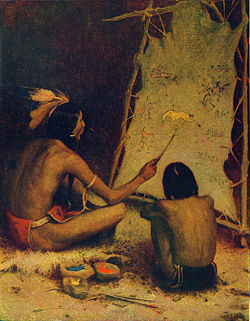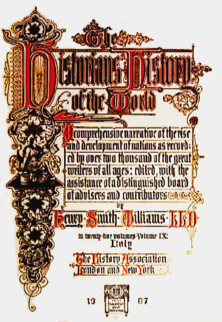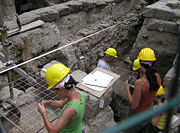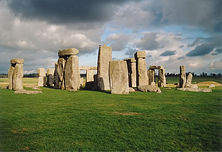History
2008/9 Schools Wikipedia Selection. Related subjects: British History
History is the study of the past, particularly the written record of the human race, but more generally including scientific and archaeological discoveries about the past. Recently, there has been an increased interest in oral histories and traditions, passed down from generation to generation verbally. New technology, such as photography, sound recording, and motion pictures, now complement the written word in the historical record.
Academically, history is the field of research producing a continuous narrative and a systematic analysis of past events of importance to the human race. Those who study history as a profession are called historians.
Etymology
The word history comes from Greek ἱστορία (historia), from the Proto-Indo-European *wid-tor-, from the root *weid-, "to know, to see". This root is also present in the English words wit, wise, wisdom, vision, and idea, in the Sanskrit word veda, and in the Slavic word videti and vedati, as well as others. (The asterisk before a word indicates that it is a hypothetical construction, not an attested form.).
The Ancient Greek word ἱστορία, historía, means "inquiry, knowledge acquired by investigation". It was in that sense that Aristotle used the word in his Περί Τά Ζωα Ιστορία, Peri Ta Zoa Istória or, in Latinized form, Historia Animalium. The term is derived from ἵστωρ, hístōr meaning wise man, witness, or judge. We can see early attestations of ἵστωρ in Homeric Hymns, Heraclitus, the Athenian ephebes' oath, and in Boiotic inscriptions (in a legal sense, either "judge" or "witness," or similar). The spirant is problematic, and not present in cognate Greek eídomai ("to appear"). The form historeîn, "to inquire", is an Ionic derivation, which spread first in Classical Greece and ultimately over all of Hellenistic civilization.
It was still in the Greek sense that Francis Bacon used the term in the late 16th century, when he wrote about " Natural History". For him, historia was "the knowledge of objects determined by space and time", that sort of knowledge provided by memory (while science was provided by reason, and poetry was provided by fantasy).
The word entered the English language in 1390 with the meaning of "relation of incidents, story". In Middle English, the meaning was "story" in general. The restriction to the meaning "record of past events" arises in the late 15th century. In German, French, and most Germanic and Romance languages, the same word is still used to mean both "history" and "story". The adjective historical is attested from 1561, and historic from 1669.
Historian in the sense of a "researcher of history" is attested from 1531. In all European languages, the substantive "history" is still used to mean both "what happened with men", and "the scholarly study of the happened", the latter sense sometimes distinguished with a capital letter, "History", or the word historiography
Description
Since historians are simultaneously observers of and participants in the historical process, the historical works they produce are written from the perspective of their own time and sometimes with due concern for possible lessons for their own future. In the words of Benedetto Croce, "All history is contemporary history". History is facilitated by the formation of a 'true discourse of past' through the production of narrative and analysis of past events relating to the human race. The modern discipline of history is dedicated to the institutional production of this discourse.
All events that are remembered and preserved in some authentic form constitute the historical record. The task of historical discourse is to identify the sources which can most usefully contribute to the production of accurate accounts of past. Therefore, the constitution of the historian's archive is a result of circumscribing a more general archive by invalidating the usage of certain texts and documents (by falsifying their claims to represent the 'true past').
The study of history has sometimes been classified as part of the humanities and at other times as part of the social sciences It can also be seen as a bridge between those two broad areas, incorporating methodologies from both. Some individual historians strongly support one or the other classification. In modern academia, history is increasingly classified as a social science. In the 20th century, French historian Fernand Braudel revolutionized the study of history, by using such outside disciplines as economics, anthropology, and geography in the study of global history.
Traditionally, historians have recorded events of the past, either in writing or by passing on an oral tradition, and have attempted to answer historical questions through the study of written documents and oral accounts. For the beginning, historians have also used such sources as monuments, inscriptions, and pictures. In general, the sources of historical knowledge can be separated into three categories: what is written, what is said, and what is physically preserved, and historians often consult all three. But writing is the marker that separates history from what comes before.
Archaeology is a discipline that is especially helpful in dealing with buried sites and objects, which, once unearthed, contribute to the study of history. But archaeology rarely stands alone. It uses narrative sources to complement its discoveries.
There are varieties of ways in which history can be organized, including chronologically, culturally, territorially, and thematically. These divisions are not mutually exclusive, and significant overlaps are often present, as in "The International Women's Movement in an Age of Transition, 1800–1945." It is possible for historians to concern themselves with both the very specific and the very general, although the modern trend has been toward specialization. The area called Big History resists this specialization, and searches for universal patterns or trends. History has often been studied with some practical or theoretical aim, but also may be studied out of simple intellectual curiosity.
History and prehistory
By "prehistory", historians mean the recovery of knowledge of the past in an area where no written records exist, or where the writing of a culture is not understood. By studying painting, drawings, carvings, and other artifacts, some information can be recovered even in the absence of a written record. Since the 20th century, the study of prehistory is considered essential to avoid history's implicit exclusion of certain civilizations, such as those of Sub-Saharan Africa and pre-Columbian America. Historians in the West have been criticized for focusing disproportionately on the Western world. In 1961, British historian E. H. Carr wrote:
- The line of demarcation between prehistoric and historical times is crossed when people cease to live only in the present, and become consciously interested both in their past and in their future. History begins with the handing down of tradition; and tradition means the carrying of the habits and lessons of the past into the future. Records of the past begin to be kept for the benefit of future generations.
Such a definition would include within the scope of history peoples such as Australian Aboriginals and New Zealand Maori who, before contact with Europeans, already possessed a strong interest in the past and maintained oral records transmitted to succeeding generations.
Historiography
Historiography has a number of related meanings. Firstly, it can refer to how history has been produced: the story of the development of methodology and practices (for example, the move from short-term biographical narrative towards long-term thematic analysis). Secondly, it can refer to what has been produced: a specific body of historical writing (for example, "medieval historiography during the 1960s" means "Works of medieval history written during the 1960s"). Thirdly, it may refer to why history is produced: the Philosophy of History (Historiosophy). As a meta-level analysis of descriptions of the past, this third conception can relate to the first two in that the analysis usually focuses on the narratives, interpretations, worldview, use of evidence, or method of presentation of other historians.
Historical methods
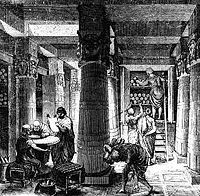
A depiction of the ancient Library of Alexandria.
Historical method basics
The following questions are used by historians in modern work.
The first four are known as higher criticism; the fifth, lower criticism; and, together, external criticism. The sixth and final inquiry about a source is called internal criticism. |
The historical method comprises the techniques and guidelines by which historians use primary sources and other evidence to research and then to write history.
Herodotus of Halicarnassus (484 BC – ca.425 BC) has generally been acclaimed as the "father of history". However, his contemporary Thucydides (ca. 460 BC – ca. 400 BC) is credited with having begun the scientific approach to history in his work the History of the Peloponnesian War. Thucydides, unlike Herodotus and other religious historians, regarded history as being the product of the choices and actions of human beings, and looked at cause and effect, rather than as the result of divine intervention. In his historical method, Thucydides emphasized chronology, a neutral point of view, and that the human world was the result of the actions of human beings. Greek historians also viewed history as cyclical, with events regularly recurring.
There were historical traditions and sophisticated use of historical method in ancient and medieval China. The groundwork for professional historiography in East Asia was established by the Han Dynasty court historian known as Sima Qian (145–90 BC), author of the Shiji ( Records of the Grand Historian). For the quality of his timeless written work, Sima Qian is posthumously known as the Father of Chinese Historiography. Chinese historians of subsequent dynastic periods in China used his Shiji as the official format for historical texts, as well as for biographical literature.
Saint Augustine was influential in Christian and Western thought at the beginning of the medieval period. Through the Medieval and Renaissance periods, history was often studied through a sacred or religious perspective. Around 1800, German philosopher and historian Georg Wilhelm Friedrich Hegel brought philosophy and a more secular approach in historical study.
In the preface to his book the Muqaddimah, historian and early sociologist Ibn Khaldun warned of seven mistakes that he thought that historians regularly committed. In this criticism, he approached the past as strange and in need of interpretation. The originality of Ibn Khaldun was to claim that the cultural difference of another age must govern the evaluation of relevant historical material, to distinguish the principles according to which it might be possible to attempt the evaluation, and lastly, to feel the need for experience, in addition to rational principles, in order to assess a culture of the past.
Other historians of note who have advanced the historical methods of study include Leopold von Ranke, Lewis Bernstein Namier, Geoffrey Rudolph Elton, G.M. Trevelyan and A.J.P. Taylor. In the 20th century, historians focused less on epic nationalistic narratives, which often tended to glorify the nation or individuals, to more objective analyses. French historians introduced quantitative history, using raw data to track the lives of typical individuals, and were prominent in the establishment of cultural history (cf. histoire des mentalités). American historians, motivated by the civil rights era, focused on formerly overlooked ethnic, racial, and socio-economic groups. In recent years, postmodernists have challenged the validity and need for the study of history on the basis that all history is based on the personal interpretation of sources. In his book In Defence of History, Richard J. Evans, a professor of modern history at Cambridge University, defended the worth of history.
Areas of study
|
|
These are approaches to history; not listed are histories of other fields, such as history of science, history of mathematics and history of philosophy.
|
Periods
Historical study often focuses on events and developments that occur particular blocks of time. Historians give these periods of time names in order to allow "organising ideas and classificatory generalisations" to be used by historians. The names given to a period can vary with geographical location, as can the dates of the start and end of a particular period. Centuries and decades are commonly used periods and the time they represent depends on the dating system used. Most periods are constructed retrospectively and so reflect value judgments made about the past. The way periods are constructed and the names given to them can affect the way they are viewed and studied.
Geographical locations
Particular geographical locations can form the basis of historical study, for example, continents, countries and cities.
Regions
- History of Africa
- History of the Americas
- History of North America
- History of Central America
- History of the Caribbean
- History of South America
- History of Antarctica
- History of Australia
- History of New Zealand
- History of the Pacific Islands
- History of Eurasia
- History of Europe
- History of Asia
- History of East Asia
- History of the Middle East
- History of South Asia
- History of Southeast Asia
Military history
Military history studies conflicts within human society usually concentrating on historical wars and warfare including battles, military strategies and weaponry. However, the subject may range from a melee between two tribes to conflicts between proper militaries to a world war affecting the majority of the human population. Military historians record the events of military history.
Social history
Social history is the study of how societies adapt and change over periods of time. Social history is an area of historical study considered by some to be a social science that attempts to view historical evidence from the point of view of developing social trends. In this view, it may include areas of economic history, legal history and the analysis of other aspects of civil society that show the evolution of social norms, behaviors and more.
Diplomatic history
Diplomatic history, sometimes referred to as "Rankian History" in honour of Leopold von Ranke, focuses on politics, politicians and other high rulers and views them as being the driving force of continuity and change in history. This type of political history is the study of the conduct of international relations between states or across state boundaries over time. This is the most common form of history and is often the classical and popular belief of what history should be.
People's history
A people's history is a type of historical work which attempts to account for historical events from the perspective of common people. A people's history is the history of the world that is the story of mass movements and of the outsiders. Individuals not included in the past in other type of writing about history are part of this theory's primary focus, which includes the disenfranchised, the oppressed, the poor, the nonconformists, and the otherwise forgotten people. This theory also usually focuses on events occurring in the fullness of time, or when an overwhelming wave of smaller events cause certain developments to occur.
Gender history
Gender history is a sub-field of History and Gender studies, which looks at the past from the perspective of gender. It is in many ways, an outgrowth of women's history. Despite its relatively short life, Gender History (and its forerunner Women's History) has had a rather significant effect on the general study of history. Since the 1960s, when the initially small field first achieved a measure of acceptance, it has gone through a number of different phases, each with its own challenges and outcomes. Although some of the changes to the study of history have been quite obvious, such as increased numbers of books on famous women or simply the admission of greater numbers of women into the historical profession, other influences are more subtle.
Pseudohistory
Pseudohistory is a term applied to texts which purport to be historical in nature but which depart from standard historiographical conventions in a way which undermines their conclusions. Works which draw controversial conclusions from new, speculative or disputed historical evidence, particularly in the fields of national, political, military and religious affairs, are often rejected as pseudohistory.
In many countries, such as the Japan, Russia, and the United States, the subject taught in the primary and secondary schools under the name "history" is censored for political reasons. To give just a few of many examples: in Japan, mention of the Nanking Massacre has been removed from textbooks; in Russia under Stalin, history was rewritten to conform with communist party doctrine; and in the United States the history of the American Civil War is censored to avoid giving offense to White Southerners.
This practice goes back to the earliest recorded times. In Book Three of The Republic, Plato recommends that citizens be taught lies in order to instill patriotism.
Those who do not understand how real history is researched and annotated may believe what they learn in primary and secondary school, and develop a distorted worldview. There is evidence, however, that few students remember any of the "history" they are taught..
Is history a science?
Professional historians debate the question of whether history is a science or a liberal art. The distinction is artificial, as many view the field from more than one perspective. Professional historians also debate the question of whether history be taught as a single coherent narrative or a series of competing narratives. For the recent argument in support for the transformation of history into science see Peter Turchin's article "Arise Cliodynamics" in "Nature".
